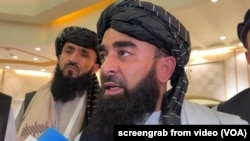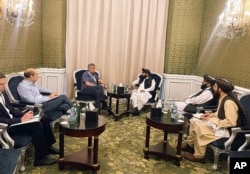A United Nations-led two-day conference of special envoys for Afghanistan from nearly two dozen countries kicked off Sunday in Qatar with the Taliban demanding an end to financial sanctions and expressing a desire for greater engagement with the West while dismissing curbs on women's freedom as a policy difference.
This is the first time the Taliban participated in the gathering to discuss international engagement with Afghanistan since U.N. Secretary-General Antonio Guterres initiated what is commonly referred to as the "Doha process" a year ago.
Rosemary DiCarlo, U.N. undersecretary-general for political and peacebuilding affairs is presiding over the talks.
Delegates attending the conference told VOA, the hard-line group's participation was a boon for the process, despite intense criticism from women's rights groups in and outside Afghanistan for excluding rights activists. To ensure the Taliban did not skip the meeting as they did in February because activists were invited, the U.N. decided not to bring them to the official event.
The Taliban were not invited to the first round in May last year.
Taliban's pitch
Zabihullah Mujahid, chief spokesperson of the Taliban's interim government, is leading the Kabul delegation. Addressing the gathering, Mujahid urged unfreezing Afghan funds and lifting banking sanctions that have cut off the country from the international financial system, saying such actions were hindering the economic progress his government was aiming for.
"Afghans are questioning why the easing of sanctions on financial and trade sectors remains slow-paced? Why the government and the private sector are consistently confronting various challenges?" Mujahid asked the gathering that included representatives from the World Bank and the Asian Development Bank.
The U.S. froze $7 billion of Afghan central bank funds after the Taliban took control of the country in August 2021. In 2022, the Biden administration put half the money in a Switzerland-based trust account called “Fund for the Afghan People,” which a board oversees. The remaining money is locked in the U.S.
The Taliban delegation head did not directly reference the ban on girls' education and women's employment in most sectors, or curbs on their mobility, instead hinting at them as cultural, religious and policy differences. In a recent report, U.N. special rapporteur Richard Bennet called the Taliban's hard-line practices an "attack on the entire civilian population, amounting to crimes against humanity."
"I do not deny that some countries may have problems with some measures of the Islamic Emirate," Mujahid said using the title the regime uses for itself.
"The policy differences should not escalate to the extent that powerful countries use their leverage to impose security, political, and economic pressures on our people, affecting the lives of our nation in a significant way," Mujahid added, apparently criticizing the way the United States and other western countries have been pressuring the Taliban to soften their stance. Mujahid instead called on countries to separate "Afghanistan's internal matters from foreign relations."
Referring to growing bilateral engagement with Russia, China, and others, Mujahid said the de facto rulers were keen to engage with the West.
"We hope that Western countries will also prioritize mutual bilateral interests in a similar manner," he said.
Prior to the start of formal talks Sunday, the Taliban held bilateral meetings with delegates from Russia, Saudi Arabia, India and Uzbekistan. While no country has recognized the Taliban government since the group came to power in August 2021 at the end of the 20-year, U.S.-led war, at least 16 countries have diplomatic missions in Afghanistan. Only Beijing has exchanged ambassadors with Kabul.
Response to Taliban
"Everyone stated their position. It was good. Everyone talked about engagement," Asif Durrani, Pakistan's special representative for Afghanistan told media covering the summit. "The very fact that Taliban attended shows the U.N. could prevail."
Despite severe criticism by global rights group of the U.N.'s decision to exclude Afghan women from the event and their issues from the agenda, no country boycotted the gathering. Delegates from the United States, Canada, Norway, and other western countries as well as the European Union are taking part in the talks along with representatives of the Shanghai Cooperation Organization, and the Organization of Islamic Cooperation.
"There is pressure to attend. There is a realization to make the best of it, to build on it," said a Western diplomat speaking on background to VOA.
They added that it was good that countries were choosing a structured process to deal with the Taliban and that despite nearly three years of Taliban rule, there was still a huge divide between the de facto rulers and the global community.
Speaking to media on the sidelines, Durrani said delegates raised the issue of women's rights during the closed-door speeches. The Taliban gave measured, "palatable" responses to issues that were difficult for them, he added.
Despite participants expressing concerns about the presence of terrorist groups on Afghan soil and calling out the regime for its treatment of women and girls, Mujahid seemed upbeat afterward.
"The views of all countries seems positive about Afghanistan," Mujahid said responding to a VOA question while talking to the media. "Because everyone wants to cooperate with Afghanistan. Which is good. We want to boost our relations with the countries which are already in touch with us, and those who aren’t, they should come and give importance to interacting with Afghanistan and cooperate with the people of Afghanistan."
More than one delegate told VOA the mood during the talks was good and a positive tone was set for similar engagement in the future.
Discussions on improving conditions for Afghanistan's private business sector, including exploring ways to collaborate on entrepreneurship, job creation, Islamic finance, and access to markets will take place Monday. This will be followed by talks regarding sustaining the Taliban's ban on opium poppy cultivation, it's impact on women, and providing alternative livelihoods to poppy farmers.
U.N. representatives and delegates from various countries plan to meet with Afghan civil society activists after the conference Tuesday. In a post on social media platform X, the Taliban foreign ministry official Zakir Jalali insisted this meeting would not mean the Taliban will be sharing the spotlight.
"If several special envoys meet with someone after the meeting of the participants, it has nothing to do with Doha-3," he said.

